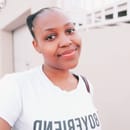Coconut: A brown fruit that is white on the inside.
Of all the books I have read this year, none have stuck in my head more than Kopano Matwa’s Coconut. This book tells the story of two young black girls whose life experiences are vastly different but come together beautifully in the story to showcase the burden that the history of South Africa has put on its “born free” generation.
I hope this review won’t be too much of a spoiler. But trust me, anything I say here won’t ruin the experience of actually reading the book yourself – it’s a masterpiece. Firstly, let me give you a brief background about the author. Kopano Matlwa is a black, female, South African writer, doctor and mother. She has three degrees, one of which is a Bachelor degree in Medicine from the University of Cape Town (Ayee represent!). Coconut is her debut novel – in 2018 it won her the Wole Soyinka African Literary Prize. She has written three other books: Spilt Milk, Period Pain and Evening Primrose (I am definitely going to be reading the latter of these). In January 2010, she began her studies at the University of Oxford as a Rhodes Scholar. She attained her Master of Science in Global Health Science in 2012 and a Population and Public Health PhD in 2017. She wrote Coconut during her Undergraduate Medical degree and went on to graduate with a distinction (how she achieves this level of excellency also beats me!).
Coconut reveals the psychological scars engraved in black people by apartheid. The novel is woven around the lives of Ofilwe and Fikile. Ofilwe lives a life of privilege which she takes for granted. However, she has a hard time embracing her culture. This is a result of her desire to adopt a ‘white culture’ which has certain benefits accompanying it. Fikile, who prefers to be called Fix, is a hip and sassy township girl. However, she has not lived an easy life. She is an ambitious go-getter, desperate to live the sophisticated city life of white people because she is tired of poverty.
Through the lives of these two characters, Matlwa shows that being a ‘born-free’ in South Africa is a fallacy. Ofilwe is financially privileged but she is subject to a lot of stereotyping because of her blackness. Fikile struggles to get by each day because the new South Africa hasn’t afforded her the life that black people envisaged when the democratic government took over. Because of this, our protagonists are forced to conform to whiteness in the way in which they think and exist in South Africa. Like I said, I won’t spoil it too much for you, so let me stop here before I say too much regarding the characters.
Moral of the book
We see the psychological scars of Apartheid in Ofilwe, who one might think lives a better life because the new South Africa has allowed her the chance to live a privileged life (which was previously only offered to white people). On the contrary, she is still subject to oppression – not necessarily the violent, overt and institutionalised kind one expects, but that which makes her question the validation of her blackness. Even though Ofilwe lives the life that many black people dreamt of having but were unable to attain, she is still black and is thus burdened. Even though she is upper class, she still has a skin colour which comes with a lot of baggage in the setting in which she is placed.
Fikile on the other hand longs for the life lived by Ofilwe. She dreams of the day she will leave the township and finally be allowed to express a new and privileged identity by ignoring her blackness which she sees guilty of not affording her the life that she longs for. Through the novel, Matlwa teaches black people that as much as we may want the privileges offered by whiteness, we should never invalidate our blackness as it is something that we can never strip ourselves of. She teaches us to embrace who we are and find beauty within ourselves because the more we try to fit in, the more we strip the value of our identity. So, I urge you to read Coconut – I promise you an exhilarating adventure with insight that will make you question your self-portrayal and what that means.
Pull Quotes
“You will find Ofilwe that people you strive so hard to be like will one day reject you because as much as you may pretend, you are not of their own. Then you will turn back, but there too you will find no acceptance, for those you once rejected will no longer recognise the thing you have become. So far, too far to return. So much, too much you have to change. Stuck between two worlds, shunned by both”
Kopano Matlwa, Coconut


